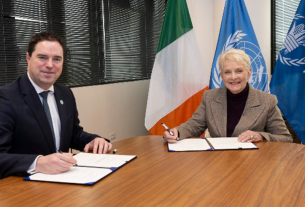The Pentagon has exceeded a three-month time limit set by lawmakers to hand over an investigation into its role in the killing of more than 160 civilians in Nigeria in 2017.
In September, the Protection of Civilians in Conflict Caucus called on Defense Secretary Lloyd J. Austin III to disclose details of the U.S. role in the January 17, 2017, airstrike on a displaced persons camp in Rann, Nigeria. While the Nigerian air force expressed regret for carrying out the attack, which also seriously wounded more than 120 people, it was referred to as an instance of “U.S.-Nigerian operations” in a formerly secret U.S. military document first revealed by The Intercept in July.
Just days after the attack, U.S. Africa Command secretly commissioned Brig. Gen. Frank J. Stokes to undertake an “investigation to determine the facts and circumstances” of the airstrike while avoiding questions of wrongdoing or recommendations for disciplinary action, according to the document, which The Intercept obtained via the Freedom of Information Act. Stokes’s findings were never made public.
The Protection of Civilians in Conflict Caucus — Reps. Sara Jacobs, D-Calif.; Jason Crow, D-Colo.; Ro Khanna, D-Calif.; Andy Kim, D-N.J.; and Tom Malinowski, D-N.J. — asked Austin to turn over the nearly six-year-old investigation and answer a series of questions concerning the attack and U.S.-Nigerian military operations within 90 days; that deadline expired almost two weeks ago.
“The Pentagon’s failure to provide information and documents … to determine possible U.S. involvement in an airstrike that took many civilian lives in northeast Nigeria does not bode well for the U.S. government’s expressed commitment to transparency and accountability,” Anietie Ewang, Human Rights Watch’s Nigeria researcher told The Intercept. “It sends a worrisome message that, at minimum, the Defense Department is unwilling to engage on an issue affecting countless lives and may even reflect an attempt to evade responsibility.”
In August, the Pentagon unveiled a Civilian Harm Mitigation and Response Action Plan, which provides a blueprint for improving how the U.S. military addresses civilian harm. The plan calls for a new emphasis on the “proactive release of information” and “transparency regarding [Defense Department] policies and processes for mitigating and responding to civilian harm” — but not until next year.
The formerly secret AFRICOM document obtained by The Intercept, along with reporting by Nigerian journalists and interviews with experts, suggests that the U.S. may have launched this rare internal investigation because it secretly provided intelligence or other support to the Nigerian armed forces who carried out the deadly strike.
Neither lawmakers nor the Pentagon were eager to comment on the missed deadline. Spokespersons for Crow, Jacobs, Kim, Khanna, and Malinowski declined to comment. Lt. Col. Phillip Ventura, a Pentagon spokesperson, was unable to answer questions about the status of the congressional request during a phone conversation last week and expressed pessimism about the prospect of providing anything substantive prior to publication. “I don’t think we’re going to get a lot of joy on this one,” he told The Intercept.
In a statement sent to The Intercept after this article was published, Ventura wrote: “The Department of Defense is aware of the matter and addressing the concerns of Congress directly with them. As a Department, we have long-recognized the strategic and moral importance of mitigating harm to civilians — whether resulting from a U.S. military operation or an operation conducted by our allies and partners — and we will continue to improve by implementing the steps outlined in the Civilian Harm Mitigation and Response Action Plan (CHMR-AP), which Secretary Austin approved in August of this year.”
A spokesperson for Rep. Sara Jacobs said Defense Department officials were “working on this request.” She would not elaborate further on the Pentagon’s response or lack thereof.
“The congressional caucus should be persistent so that the necessary information comes to light,” Ewang told The Intercept.
Update: December 20, 2022, 1:09 p.m. ET
This story has been updated to include a statement from the Defense Department received after publication.



